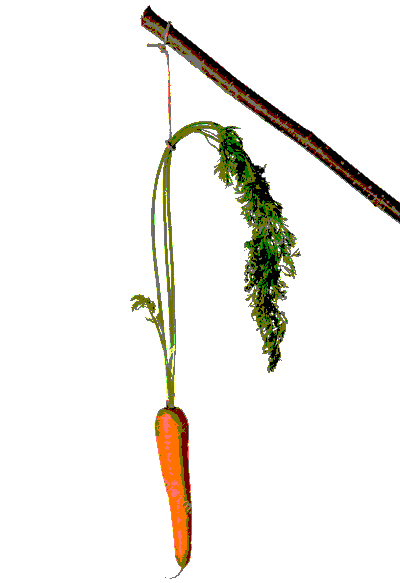Punishment over praise if goal is to behave
 When modifying behaviour, researchers have investigated whether the carrot or the stick is a better tool.
When modifying behaviour, researchers have investigated whether the carrot or the stick is a better tool.
A simple experiment devised at Washington University suggests that punishments are more likely to influence behaviour than rewards.
The study found that losses - or punishments - had an impact two to three times greater than gains - or rewards.
In one study group, students listened to a series of clicking noises and indicated whether they heard more clicks in the left or right ear. In another group, students watched for flashes of light on a screen and indicated whether they saw more flashes on the right or left side.
The number of clicks and flashes on each side were randomised and often very close together, making the task challenging and the students often uncertain of the correct response.
Every time a student made a choice, the researchers randomly displayed a token for 5, 10, 15, 20 or 25 cents that was given as a reward for the correct answer or taken away as a punishment for an incorrect response.
As might be expected, when a student was rewarded, he or she tended to repeat the previous choice, a tendency that grew stronger as the award increased.
When a student was punished, he or she strongly avoided the previous choice.
But unlike the response to a reward, no matter how large a sum was lost, the students showed a strong and consistent tendency to avoid the previous choice.
This was true in both groups - among those who heard clicks and those who viewed flashes - demonstrating that the stimulus itself did not matter.
“Objectively, you'd think that winning 25 cents would have the same magnitude of effect as losing 25 cents, but that's not what we find,” said the study's lead author, Jan Kubanek, PhD.
The study could aid the understanding of learning behaviours. For example, it may help answer the question; would students learn more efficiently if their teachers rewarded correct answers or pointed out incorrect ones?
In some situations it appears it may be better to deduct points when students are wrong than to reward them for correct answers.
“Regarding teaching strategies, our study suggests that negative feedback may be more effective than positive feedback at modifying behaviour,” Kubanek said.
“Our study showed that such feedback does not have to be harsh, since it appears that we tend to react in the same manner to any amount of negative feedback.
“From an evolutionary perspective, people tend to avoid punishments or dangerous situations. Rewards, on the other hand, have less of a life-threatening impact.”
This, the researchers say, could help explain why students in the study strongly avoided repeating mistakes, no matter how big the punishment was.








 Print
Print